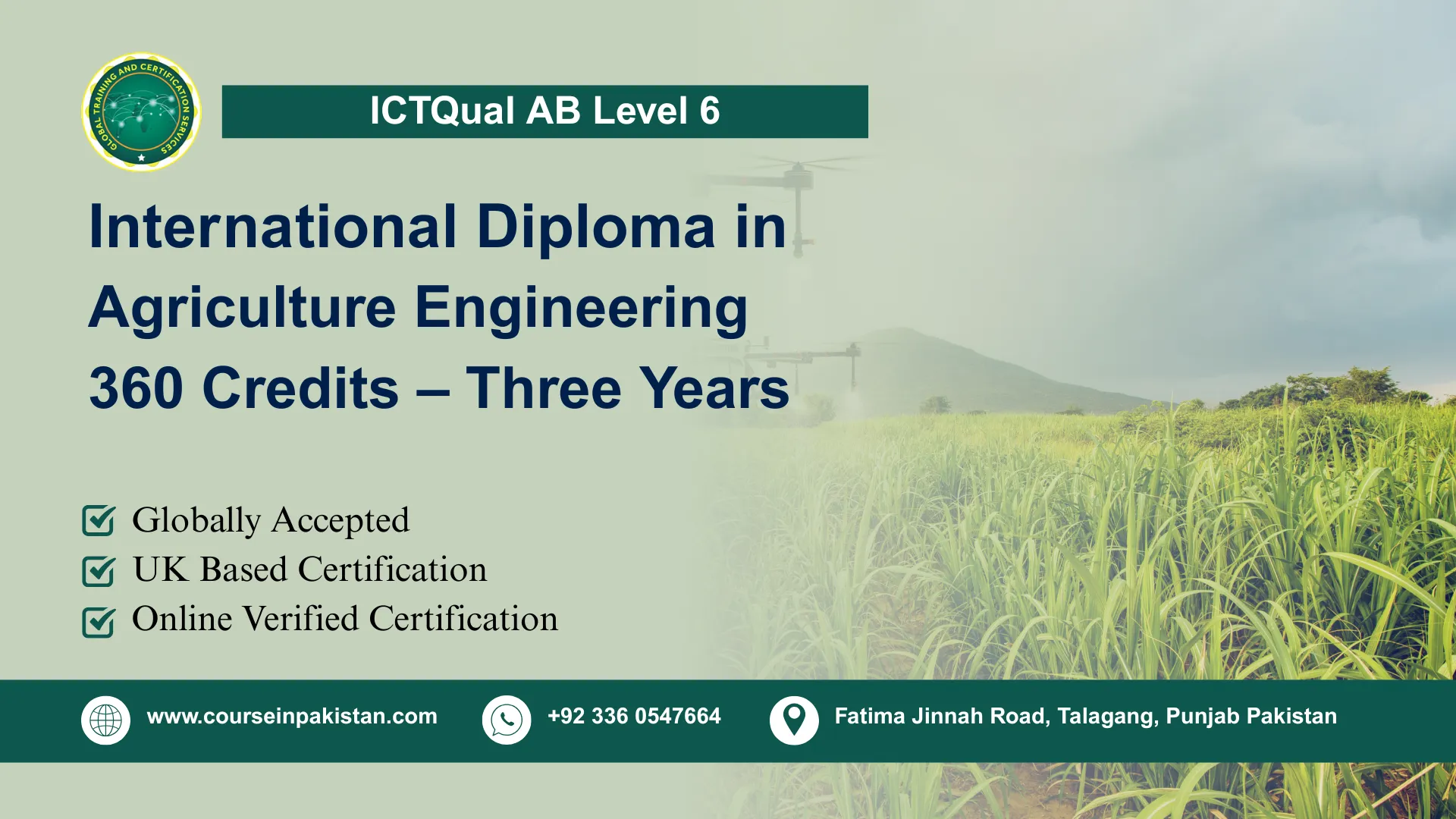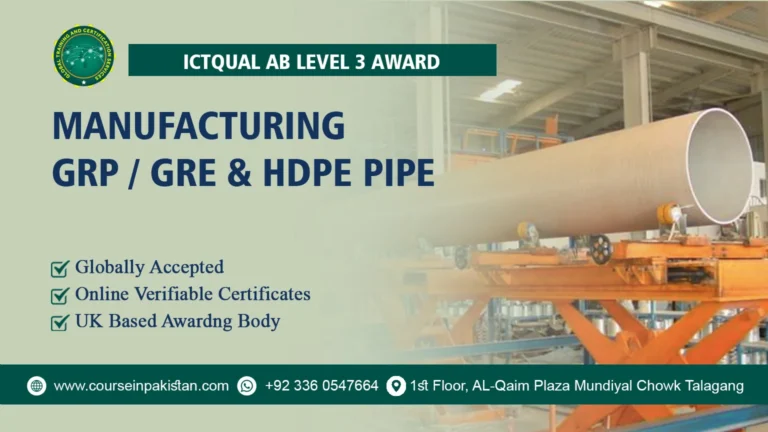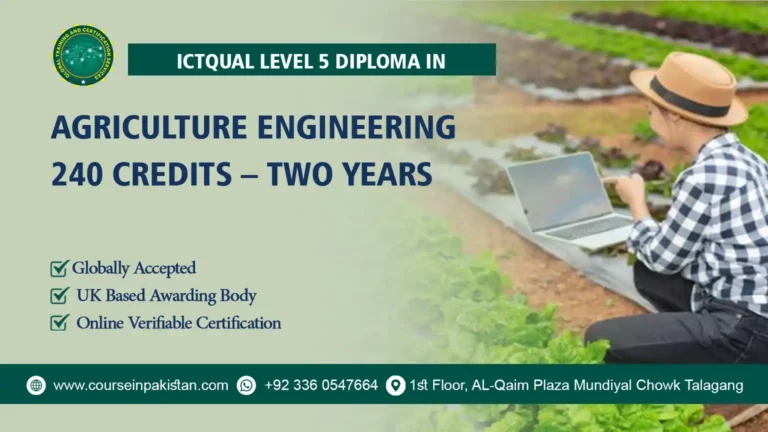
The ICTQual Level 6 Diploma in Agriculture Engineering 360 Credits – Three Years is a globally recognized professional qualification designed to equip learners with advanced knowledge and skills in modern agricultural engineering. This three-year, 360-credit program is ideal for individuals aiming to excel in the agriculture, farming, and agro-industrial sectors, combining theoretical foundations with practical applications.
This program is fully assignment-based, allowing learners to study at their own pace and from anywhere in the world. It is British Council verifiable, MOFA and Embassy attested, making it highly suitable for international career opportunities and iqama approval in Gulf countries. Fresh students are required to complete all 36 mandatory assignments within 3 years, while experienced professionals with at least 6 years of relevant experience can complete the certification faster by submitting verifiable experience and participating in professional discussion meetings with an ICTQual AB Approved assessor.
Course Overview
The ICTQual Level 6 Diploma in Agriculture Engineering prepares learners to develop expertise in agricultural machinery, soil and water management, crop production systems, and sustainable farming technologies. The curriculum combines advanced engineering concepts with modern agricultural practices, including mechanization, automation, and environmental management.
Learners will gain the skills necessary to design, implement, and manage agricultural engineering projects efficiently while considering sustainability, innovation, and economic feasibility. By the end of this qualification, candidates will be proficient in applying engineering principles to enhance agricultural productivity and efficiency. The program suits both fresh graduates and experienced practitioners seeking accelerated recognition of their knowledge and expertise.
This qualification ensures graduates are job-ready, globally recognized, and fully equipped to meet modern agricultural engineering challenges.
Key Highlights of the Course:
- Fully assignment-based 360-credit program with flexible, self-paced learning.
- British Council verifiable, MOFA and Embassy attested.
- Suitable for fresh graduates and experienced professionals (with accelerated recognition for 6+ years of relevant experience).
- Emphasis on practical agricultural engineering applications, sustainability, and innovation.
- Covers soil, water, machinery, crop systems, automation, and project management.
Course Benefits
Career Advancement
- Prepare for leadership and technical roles in agriculture engineering and agro-industries.
- Gain recognized qualifications for iqama approval and international job prospects.
- Increase employability in agricultural project management and mechanization sectors.
Skill Development
- Master advanced agricultural machinery and equipment design.
- Develop expertise in irrigation, soil management, and crop production systems.
- Learn to implement automation, smart farming technologies, and sustainability practices.
Professional Recognition
- Obtain a globally recognized, MOFA and Embassy attested qualification.
- Validate your skills and experience with ICTQual AB’s professional assessment process.
Project and Research Expertise
- Gain hands-on experience through applied assignments and capstone projects.
- Learn to plan, execute, and evaluate agricultural engineering projects efficiently.
Flexibility and Accessibility
- Complete assignments from anywhere in the world at your own pace.
- Fresh graduates have a 3-year window to complete all units, while experienced professionals can fast-track certification.
Course Study Units
This qualification, the ICTQual Level 6 Diploma in Agriculture Engineering 360 Credits – Three Years, consists of 36 mandatory units.
Year 1: Foundational Knowledge
- Introduction to Agricultural Engineering
- Basics of Soil Science
- Plant Science and Crop Physiology
- Introduction to Farm Machinery
- Principles of Irrigation and Drainage
- Environmental Science in Agriculture
- Mathematics for Engineers
- Fundamentals of Agricultural Economics
- Introduction to Renewable Energy in Agriculture
- Agricultural Chemistry
- Engineering Drawing and CAD
- Workshop Practices in Agricultural Engineering
Year 2: Intermediate Concepts and Applications
- Advanced Soil and Water Management
- Farm Power and Mechanization
- Agricultural Structures and Materials
- Irrigation Systems Design
- Introduction to Precision Agriculture
- Agricultural Waste Management
- Crop Protection Technologies
- Advanced Farm Machinery Operations
- Principles of Agro-Processing
- Renewable Energy Technologies in Agriculture
- Land Surveying and Mapping
- Practical Training in Agricultural Engineering
Year 3: Advanced Studies and Specialization
- Sustainable Agriculture Practices
- Advanced Irrigation and Drainage Engineering
- Farm Business Management
- Design of Agricultural Machinery
- Precision Farming Systems
- Advanced Soil Mechanics
- Climate-Smart Agriculture
- Renewable Energy Systems for Farms
- Post-Harvest Technology
- Automation in Agriculture
- Research Methods in Agriculture Engineering
- Final Project in Agricultural Engineering
Learning Outcomes
Year 1: Foundational Knowledge
Introduction to Agricultural Engineering
- Understand the role and scope of agricultural engineering in modern farming.
- Explain the fundamental principles of farm machinery, irrigation, and mechanization.
Basics of Soil Science
- Identify soil types, properties, and their impact on crop production.
- Apply soil testing and analysis techniques for agricultural planning.
Plant Science and Crop Physiology
- Understand plant growth, development, and physiological processes.
- Relate crop physiology to farm management and productivity.
Introduction to Farm Machinery
- Identify common farm machinery and their functions.
- Understand basic operational and maintenance principles of agricultural equipment.
Principles of Irrigation and Drainage
- Explain water management practices and irrigation system types.
- Understand drainage principles for optimal soil and crop health.
Environmental Science in Agriculture
- Recognize environmental factors affecting agriculture.
- Apply sustainable practices to reduce negative ecological impact.
Mathematics for Engineers
- Solve engineering problems using applied mathematics.
- Utilize mathematical techniques in agricultural engineering calculations.
Fundamentals of Agricultural Economics
- Understand basic economic principles relevant to agriculture.
- Analyze cost, profit, and resource management for farms.
Introduction to Renewable Energy in Agriculture
- Identify renewable energy sources applicable to farming.
- Explain the benefits and applications of sustainable energy solutions.
Agricultural Chemistry
- Apply chemical principles to soil fertility and crop production.
- Understand nutrient management and fertilizer usage.
Engineering Drawing and CAD
- Produce technical drawings and models of agricultural structures and machinery.
- Utilize CAD software for agricultural engineering designs.
Workshop Practices in Agricultural Engineering
- Demonstrate basic workshop skills for machinery and equipment maintenance.
- Follow safety protocols in engineering workshops.
Year 2: Intermediate Concepts and Applications
Advanced Soil and Water Management
- Implement techniques for soil conservation and water efficiency.
- Analyze soil-water relationships for irrigation planning.
Farm Power and Mechanization
- Evaluate power sources and mechanization strategies for farms.
- Operate and maintain advanced farm machinery.
Agricultural Structures and Materials
- Design basic agricultural buildings and storage facilities.
- Select appropriate materials for durability and cost-efficiency.
Irrigation Systems Design
- Design efficient irrigation layouts for various crops.
- Apply calculations for flow, pressure, and system capacity.
Introduction to Precision Agriculture
- Understand concepts of GPS, sensors, and data-driven farming.
- Apply technology for efficient crop management and monitoring.
Agricultural Waste Management
- Develop strategies for handling farm waste sustainably.
- Implement recycling and composting methods in agriculture.
Crop Protection Technologies
- Identify pests, diseases, and weeds affecting crops.
- Apply integrated pest management and protective measures.
Advanced Farm Machinery Operations
- Operate specialized machinery for planting, harvesting, and processing.
- Implement preventive maintenance and troubleshooting techniques.
Principles of Agro-Processing
- Understand post-harvest handling and value addition techniques.
- Apply basic processing methods to agricultural products.
Renewable Energy Technologies in Agriculture
- Evaluate solar, wind, and bioenergy applications on farms.
- Implement energy-efficient solutions for agricultural operations.
Land Surveying and Mapping
- Conduct land surveys for farm planning and construction.
- Utilize mapping tools and GIS applications in agriculture.
Practical Training in Agricultural Engineering
- Apply theoretical knowledge in real-world farm settings.
- Develop problem-solving skills in field and workshop scenarios.
Year 3: Advanced Studies and Specialization
Sustainable Agriculture Practices
- Implement environmentally-friendly farming methods.
- Evaluate the impact of practices on long-term soil and crop health.
Advanced Irrigation and Drainage Engineering
- Design complex irrigation and drainage systems.
- Optimize water use efficiency for large-scale farms.
Farm Business Management
- Plan, manage, and evaluate farm operations and finances.
- Apply strategic decision-making in agricultural enterprises.
Design of Agricultural Machinery
- Create innovative machinery designs for efficiency and productivity.
- Incorporate ergonomics, safety, and cost considerations.
Precision Farming Systems
- Integrate sensors, GPS, and automation for precision agriculture.
- Analyze data to enhance crop yield and resource efficiency.
Advanced Soil Mechanics
- Study soil behavior under different loads and environmental conditions.
- Apply knowledge to design foundations and agricultural structures.
Climate-Smart Agriculture
- Develop strategies to adapt farming to climate change.
- Implement resilient practices for sustainable crop production.
Renewable Energy Systems for Farms
- Design farm-scale renewable energy systems.
- Evaluate economic feasibility and environmental benefits.
Post-Harvest Technology
- Apply techniques for storage, preservation, and quality maintenance.
- Reduce post-harvest losses using modern technologies.
Automation in Agriculture
- Implement robotics and automated systems in farm operations.
- Optimize labor and improve precision in agricultural processes.
Research Methods in Agriculture Engineering
- Conduct scientific research and analyze agricultural data.
- Prepare reports and present findings using engineering methodologies.
Final Project in Agricultural Engineering
- Undertake an independent research or practical project.
- Demonstrate integration of knowledge, skills, and problem-solving abilities.
Who is This Course For?
- Aspiring Agricultural Engineers
- Individuals seeking a professional career in agriculture engineering and agro-industrial sectors.
- Learners with a keen interest in modern farming technologies, machinery, and sustainable agricultural practices.
- Fresh Graduates
- Students who have completed secondary or tertiary education and want to specialize in agricultural engineering.
- Motivated to complete 36 mandatory assignments within 3 years.
- Experienced Professionals
- Individuals with at least 6 years of relevant agricultural engineering experience.
- Professionals looking for accelerated certification by submitting verifiable experience and defending knowledge in professional discussions.
- Entrepreneurial and Innovators
- Those planning to establish or manage agricultural projects, farms, or agro-industrial businesses.
- Learners interested in sustainable and smart farming technologies.
Future Progression
- Advance to senior roles such as Agricultural Engineer, Farm Manager, or Project Coordinator in agro-industries.
- Pursue specialized roles in irrigation, soil management, mechanization, and smart farming systems.
- Opportunity to lead sustainable agriculture projects and rural development initiatives.
- Qualify for international roles in agriculture engineering and consultancy.
- Potential to start entrepreneurial ventures in agritech and sustainable agriculture.
Academic Pathways:
- Progress to postgraduate studies in Agricultural Engineering, Agronomy, or Agro-Industrial Management.
- Pathway to professional certifications in precision farming, engineering, and agricultural project management.
- Opportunity to enroll in research-focused programs in sustainable agriculture and food security.
- Bridge to international diplomas or higher-level engineering qualifications in related fields.
Conclusion
The ICTQual Level 6 Diploma in Agriculture Engineering equips learners with advanced technical knowledge, practical skills, and professional competencies required for modern agricultural and agro-industrial sectors. With its flexible, assignment-based structure, this qualification is ideal for both fresh graduates and experienced professionals, providing international recognition, MOFA and Embassy attestation, and pathways to career advancement and entrepreneurial opportunities in agriculture engineering.






